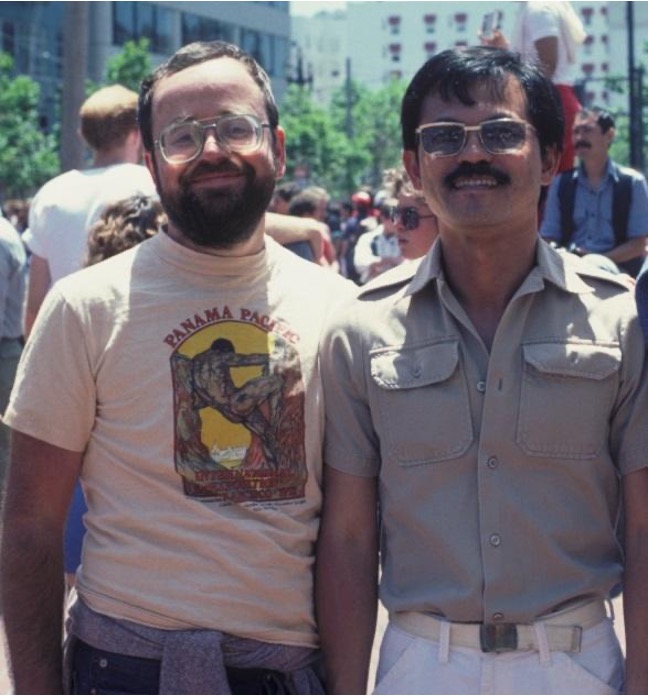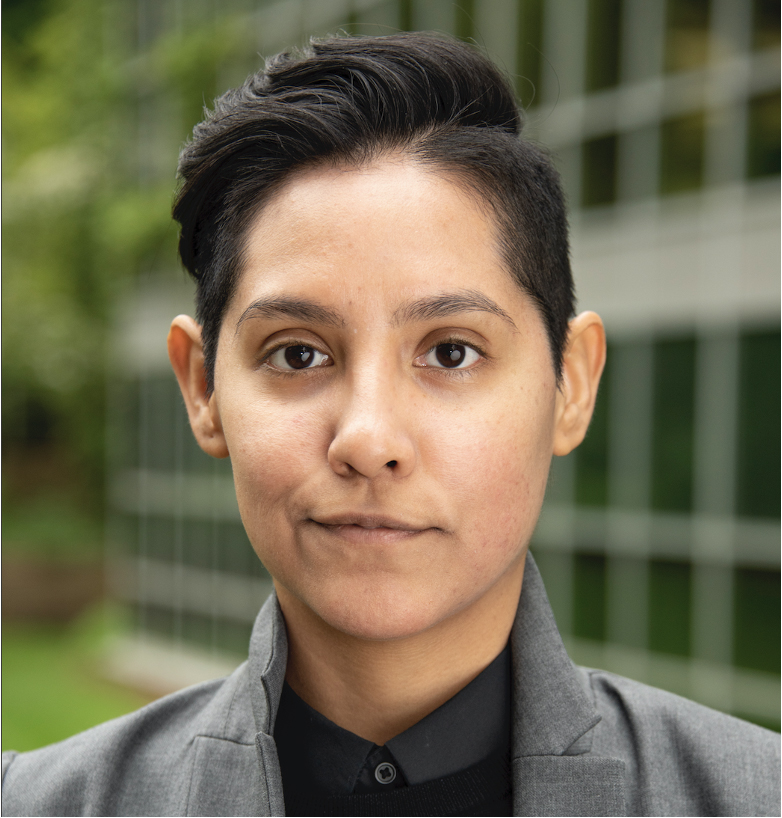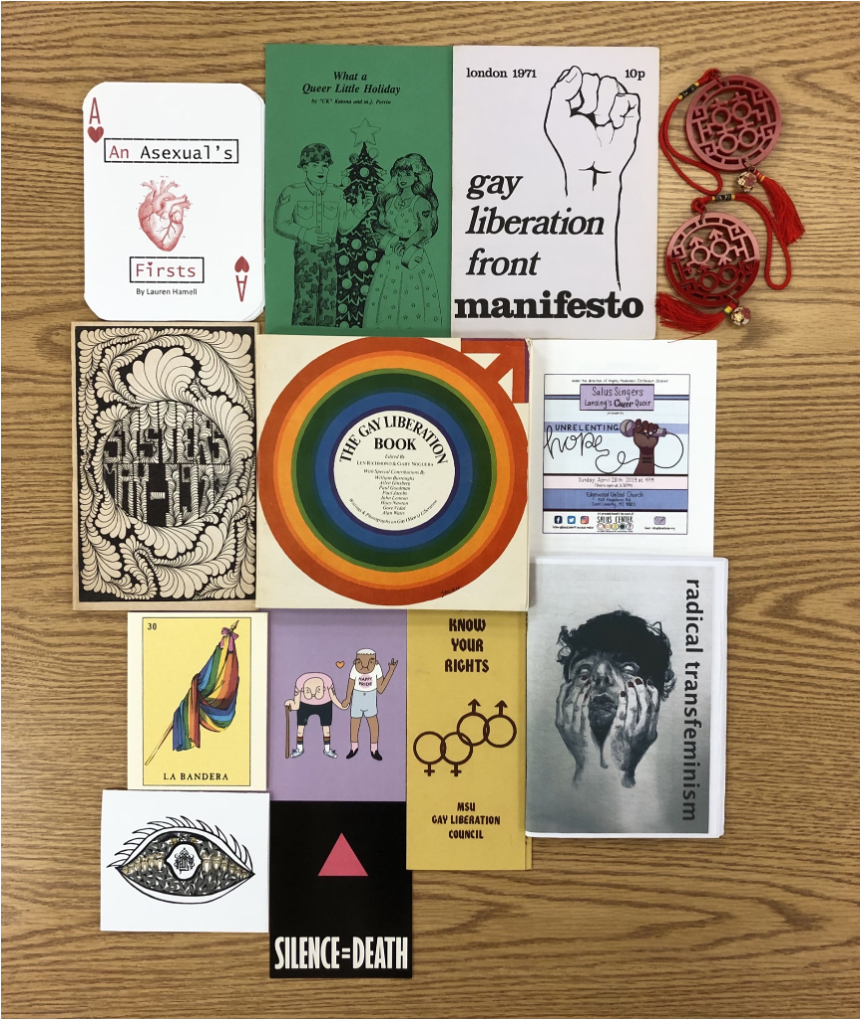October is LGBT History Month, which differs from Pride Month. While it is always important to highlight the voices of those who came before us, it is especially important this month. Stephen O. Murray, a Michigan State University alum from James Madison College, and his partner Keelung Hong donated funds to support the MSU Libraries Special Collections and, in 2020, the collection was renamed the Stephen O. Murray and Keelung Hong Special Collections. The collections hold over 450,000 printed works, numerous manuscript and archival collections, and an extensive collection of ephemera.
Stephen O. Murray and Keelung Hong

Murray was born in St. Paul, Minnesota, and was a part of the second graduating class of James Madison College at MSU in 1968. Murray had double majors in social psychology as well as justice, morality and constitutional democracy. After graduation, he attended the University of Arizona for his master’s in sociology and earned his doctorate in sociology from the University of Toronto. Murray later completed postdoctoral training in anthropology at the University of California, Berkeley.

To honor Murray, Hong donated a historical collection of his late spouse’s work to the MSU Libraries Special Collections.
Eli Landaverde and the LGBTQ+ Collection
The LGBTQ+ Collection, which houses pieces of Michigan State history, is kept within the MSU Libraries Stephen O. Murray and Keelung Hong Special Collections. In the 1970s, MSU bibliographer Anne E. Tracy began archiving gay and lesbian material, making it one of the earliest academic libraries to collect LGBTQ+ material.
Tracy’s pioneering work in this space was recognized in 1997 and again in 2002 with Prism Awards, and she was named one of the 10 Influential Michigan Queers in 1995 by the newspaper, Between the Lines.
The collection holds archival records and early primary materials from the Gay Liberation Movement and includes printed art, periodicals, popular literature, recorded music, zines, personal papers and records.
“It’s a very important collection that’s popular, not just on campus, but we have researchers from all over the country and sometimes overseas coming to use materials in this collection,” said Special Collections LGBTQ+ Librarian Eli Landaverde.

“People would bring items for the collection like it was actively managed when it wasn’t pursuing more material,” said Landaverde. “There were noticeable gaps in areas. In addition to many groups not being represented, the latest collection materials were on civil partnerships. Gay marriage wasn’t even documented. It was even called the GLBT Collection, an outdated term.”
Seeing a lot of potential for improvement in the collection, Landaverde became the special collections LGBTQ+ librarian in 2020.
“I often partner with different classes. We talk about how to use special collections. I give them a brief history of this collection, in particular, how it started.”
A piece of MSU LGBTQ+ history
One important piece of the collection that Landaverde shared is from 1971: a letter from MSU’s Gay Liberation Movement, a student organization that started on campus in the early 1970s.
The organization was housed in the Student Services Building on the third floor, where the Gender and Sexuality Campus Center is today.
According to Landaverde, the 1971 letter is a very early example of queer activism on campus from one of Michigan’s first gay organizations. The letter, addressed to the director of the library at the time, Richard Chapin, demanded money for the library to buy specific books about gay people.
The letter listed books like “Homosexual Liberation: A Personal View” by John Murphy, “On Being Different: What It Means to be a Homosexual” by Merle Miller and “The Gay Liberation Movement” by Jack Onge. They also asked for four newspapers and magazines, including “Tangents,” “Gay Activist,” “Gay Liberator” and “Spectre.”
In addition, a 1971 Gay Liberation Movement newsletter in the collection includes:
- information about a Wednesday meeting in Bessey Hall, Room 209, on Feb. 24 at 7:30 p.m.;
- an announcement that they joined a new group called the MSU Radical Lesbians;
- references to a coffeehouse called the Albatross, which was located on Grand River Avenue across from Berkey Hall and where the group often met;
- an invitation to a dance held on Friday, March 5: “A number of straight people at Brody Complex have invited us to attend a dance to be held at Brody. So, feel free to attend . . . dance together if you want to.”
Previously, Special Collections was located in the basement of the Main Library. However, following renovations made possible by a generous financial gift from Hong, the Stephen O. Murray and Keelung Hong Special Collections began the process of relocating to the third floor of the Main Library’s East Wing in August.
Although the collection is currently unavailable, with the reading room closed and programming on pause, LGBTQ+ history still lives on. While you may not be able to physically access the collection at the moment, you can always reach out to Landaverde to meet and discuss the collection; they have a lot of valuable LGBTQ+ information from the collection to share. Once the collection reopens, feel free to stop by the third floor of the Main Library’s East Wing to check it out for yourself.
